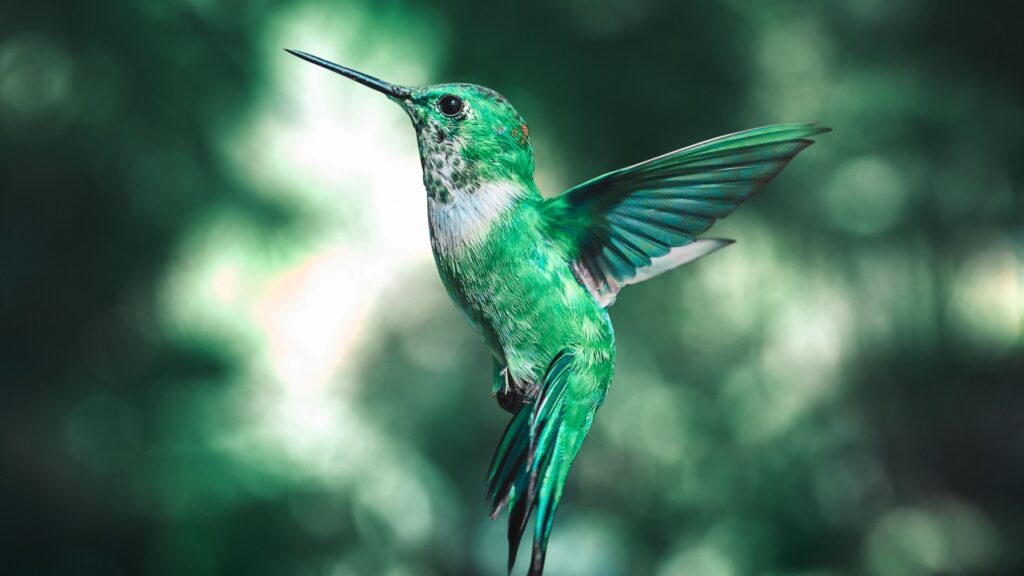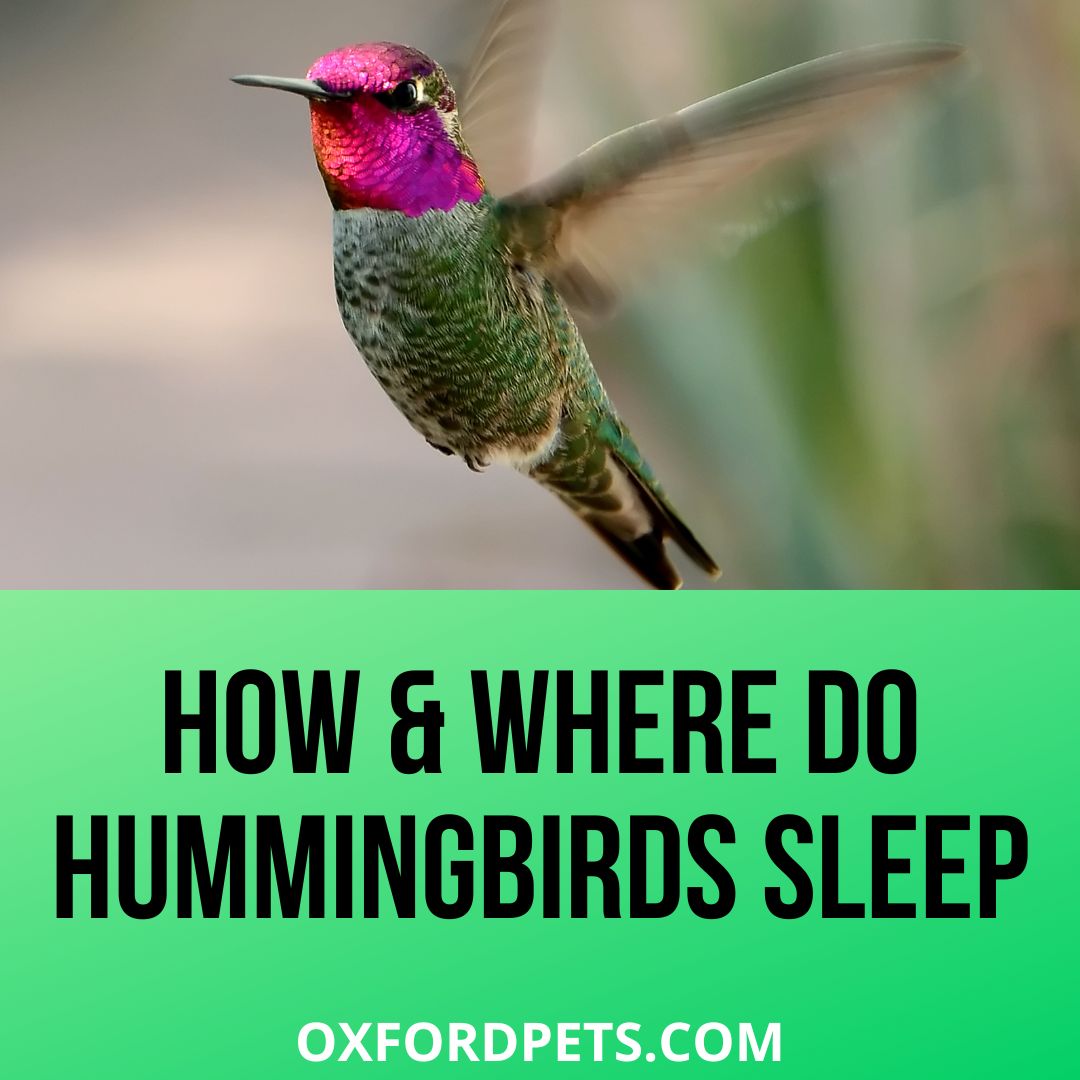Hummingbirds are super active throughout the day, but have you ever wondered whether they sleep or not?
Yes, Hummingbirds do sleep, and they are often found hanging upside down on trees and branches. They are keen on choosing trees for a good and comfortable shelter. They often find a twig that can provide shelter from wind and other weather conditions during the night. This is about summers, where during the winter season, Hummingbirds enter a deep sleep-like state known as Torpor.
Here is more about how, where, and when a Hummingbird sleeps.
For a comfortable, safe, and peaceful night’s sleep, Hummingbirds prefer trees with large leaves. They usually begin to settle in about a half hour or so before dark. Some of them go into a deep sleeping state, while others rely upon a strategy called Torpor.
Contents
- Humming Birds Torpor
- What Do Hummingbirds Look Like When They Sleep?
- Do Hummingbirds Sleep In The Same Place Every Night?
- How Long Do Hummingbirds Sleep?
- Do Hummingbirds Sleep During the Day?
- Do Hummingbirds Nest? Do Hummingbirds Sleep on Nest?
- Do Hummingbirds Sleep In Groups or Alone?
- Where Do Hummingbirds Sleep When It Rains?
- Do Hummingbirds Sleep On Feeders?
- Hummingbirds Sleep Facts
- Wrapping up…
Humming Birds Torpor
Torpor is where Hummingbirds lower the amount of energy and shut down several of their body functions. It is a hibernating state where birds give their bodies rest and conserve energy.
As the night gets cold, they allow their body to cool down. In the Torpor stage, Hummingbirds become more like lizards and other cold-blooded animals.
During the Torpor State, Hummingbirds drop their body temperature from 5°C to 10°C from 26°C when they are active. The difference in drop can be estimated by the fact that if humans drop their body temperature even by 2°C, they will become hypothermic. However, Hummingbirds, even after dropping temperature drastically, tend to survive most of the time healthily.
During the Torpor State, Hummingbirds try to maintain their body temperature closer to the outer air. With that, they require to spend less energy on any metabolic process.

What Do Hummingbirds Look Like When They Sleep?
If you ever find Hummingbirds hanging upside down, do not confuse them for dead. Why? Because Hummingbirds have been known for sleeping hanging upside down on branches. Even if you touch them gently, they won’t respond in this state, considering they are in a deep sleep.
While Hummingbirds go into the state of sleep, their toes close tightly around their perch. Since tree perches (branches) are textured, birds won’t slip.
However, in any smooth perches, Hummingbirds might slip while trying to sleep. But since they are still active, they will manage not to fall and harm themselves.
Individuals with a Hummingbird feeder in their garden might have seen these tiny birds hanging upside down from it.
Do Hummingbirds Sleep In The Same Place Every Night?
Hummingbirds tend to choose their resting and sleeping places near any food source. These birds often cover a great distance, and thus their sleeping place may likely change every night. They can bend down near their main food source and choose a safe tree to spend the night safely.
However, in places where food is plenty, Hummingbirds often spend days. And under such conditions, Hummingbirds will come back and sleep in the same spot every day. All of this depends upon bird to bird, the location, and habitat.
Hummingbirds choose redbuds, crabapples, honeysuckles, and other flowering trees and shrubs for sleeping. These plants not only provide them with plenty of shelter and safety but food as well. As Hummingbirds awake early morning, they eat as soon as possible thus, sleeping near a food source is a must for them.
How Long Do Hummingbirds Sleep?
On average, Hummingbirds sleep for 12 hours on an average which is probably from Dusk to Dawn. They don’t take afternoon naps, and you can’t find them sleeping just any time of the day.
Hummingbirds’ sleeping hours also depend upon the season. If it is the winter season, these birds can go to sleep for as long as 16 hours. After waking up, it takes about an hour for Hummingbirds to come out of their Torpor or sleeping state.
Do Hummingbirds Sleep During the Day?
Hummingbirds do not sleep more than once a day, especially not during the afternoon/ light hours. It is when their chances of being attacked by predators maximize; thus, the birds can’t afford to sleep.
If you find any Hummingbird sleeping during the day hour, the count is as abnormal. It is either due to food scarcity, deplorable weather conditions, or other wrong factors that are contributing to their sleep during the day. Hummingbirds are high on energy, and therefore they are always active throughout the day.
Do Hummingbirds Nest? Do Hummingbirds Sleep on Nest?
Besides Female hummingbirds who have just laid eggs, these creatures are less likely to sleep in the nest. Only the females who are incubating eggs or raising babies will usually sleep on the nest. Doing so helps them keep the eggs warm and for a hatchling.
Female Hummingbirds also spend more time and sleep in nests while their chicks are still young. Since the chicks do not have feathers, the mother hummer stays at the nest to provide them with the required warmth.
However, Hummingbirds prepare their own nest and are less likely will enter a birdhouse. Why? Because they do not like sleeping in small spaces.
Do Hummingbirds Sleep In Groups or Alone?
Hummingbirds spend their whole day in groups; however, when it comes to sleeping, they are Solitary. They can identify when nighttime is approaching; thus, as the Sun is about to set, Hummingbirds prepare for their bed.
Every individual bird will likely find a safe and comfortable space and lead towards her sleep for the day. Hummingbirds won’t wait and prepare sleeping space for others from their species until and unless it is about their newborn.
If you spot two or more Hummingbirds sleeping together, take it as a coincidence.
Where Do Hummingbirds Sleep When It Rains?
Hummingbirds aren’t very fond of rains; thus, with every downpour, they become more active and find shelter.
For sleeping during rain hours, they will find dense vegetation or the downwind side of a tree trunk for shelter.
Hummingbirds are excellent are finding shelters and, therefore, can make it through even the most extreme weather.
Do Hummingbirds Sleep On Feeders?
It is less likely, but Hummingbirds are seen sleeping on feeders. Less likely since Hummingbirds look for extra protection from predators while sleeping, and a feeder won’t probably provide that. That is why they tend to spend the nights in a dense tree with big leaves where they are slightly difficult to find.
However, in the scarcity of places to sleep, Hummingbirds may also sleep on feeders.
Where do Hummingbirds sleep during winters?
During winters, Hummingbirds sleep in obvious places like trees. However, instead of sleeping, they enter the state of Torpor on cold nights. During winters, Hummingbirds enter Torpor even during the day hours depending if the weather is too cold.
Hummingbirds Sleep Facts
- Hummingbirds are constantly moving when awake, so sleep is the only time they rest.
- Hummingbirds do not sleep like humans or other animals. Instead, they have a particular sleep type which is known as Torpor or No-Activation.
- Hummingbirds can sleep for as long as 16 hours of the day.
- They enter sleep mode as soon as Sun is about to settle down.
- Hummingbirds sleep hanging upside down. People often confuse their position with a dying bird.
- They do not sleep during the day/ light hours.
- They prefer sleeping alone in trees with spaced-out branches.
- Hummingbirds do not like sleeping in small spaces; therefore, it is less likely for them to enter artificial nests and bird houses.
FAQ’S
How Do Hummingbirds Find Feeders?
How to make Sugar Water/Nectar For Humming Birds
Wrapping up…
This was all for How and Where do Hummingbirds Sleep? If you spot a Hummingbird sleeping, try not to disturb the poor bird.
Since they sleep in an upside-down hanging position, a foreign disturbance can make the bird fall and harm herself.
Also, if you want to welcome Hummingbirds at night in your garden, instead of the nest, plant some trees. These birds won’t attract even the fanciest of the nest, but trees with big leaves will do the job.
